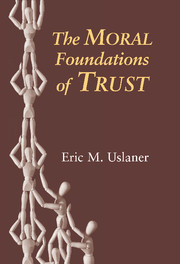Book contents
- Frontmatter
- Contents
- Preface
- 1 Trust and the Good Life
- 2 Strategic Trust and Moralistic Trust
- 3 Counting (on) Trust
- 4 The Roots of Trust
- 5 Trust and Experience
- 6 Stability and Change in Trust
- 7 Trust and Consequences
- 8 Trust and the Democratic Temperament
- Epilogue: Trust and the Civic Community
- Appendix A
- Appendix B
- Appendix C
- References
- Author Index
- Subject Index
7 - Trust and Consequences
Published online by Cambridge University Press: 12 January 2010
- Frontmatter
- Contents
- Preface
- 1 Trust and the Good Life
- 2 Strategic Trust and Moralistic Trust
- 3 Counting (on) Trust
- 4 The Roots of Trust
- 5 Trust and Experience
- 6 Stability and Change in Trust
- 7 Trust and Consequences
- 8 Trust and the Democratic Temperament
- Epilogue: Trust and the Civic Community
- Appendix A
- Appendix B
- Appendix C
- References
- Author Index
- Subject Index
Summary
Part of my attraction to [volunteer firefighting] is its vivid clarity: what we do is of immediate unalloyed benefit. The pager jolts into life and we rush to someone's urgent need, achieve a degree of resolution, then go back to what we were doing, having given completely of ourselves.
– Koren (1997, C19)A lot of what passes for volunteering used to be called simply “parenting”: people helping out in their own children's schools or coaching their own children's soccer teams. Kids with parents who already have resources end up benefiting the most.
– Mosle (2000, 25)Trust matters. People who trust others have an expansive view of their community and this helps connect them to people who are different from themselves. It also leads people to seek common ground when they disagree on solutions to public issues. In this chapter, I trace the benefits of trust both for individuals and the society. I also examine how some of the gains from trust, both public and private, have become more scarce as trust has fallen. In the next chapter, I extend this examination to look at the sources of trust and its impact cross-nationally.
Trust is not an all-purpose solution to society's problems. It won't get people involved in civic groups or in political life. But it does have other, perhaps even more important consequences. Because trust links us to people who are different from ourselves, it makes cooperation and compromise easier.
- Type
- Chapter
- Information
- The Moral Foundations of Trust , pp. 190 - 216Publisher: Cambridge University PressPrint publication year: 2002
- 2
- Cited by



